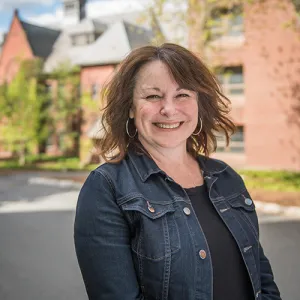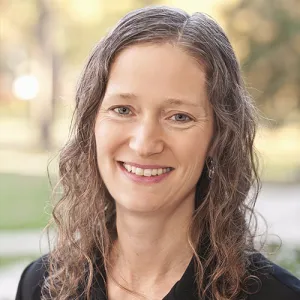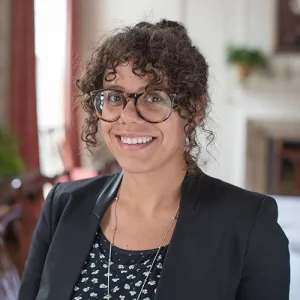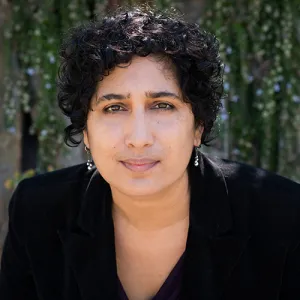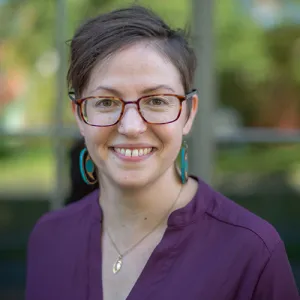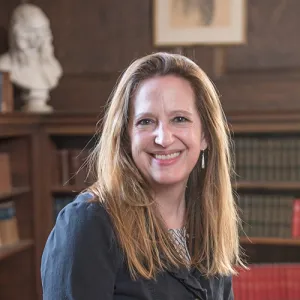
Archives Concentration
The Archives Concentration is designed to make histories of all kinds public and accessible through research projects and professional training. A combination of academic course work, practical experiences and independent research projects teach students about the institutions and repositories that shape our knowledge and understanding of our collective pasts. Students integrate classroom and hands-on learning to examine archives and archival studies, including the collection, preservation, interpretation, and display of artifacts, manuscripts and historic sites.
Announcements
Applications
Next application deadline is March 13, 2026.
Requirements & Courses
Learning Goals
Students in the archives concentration should be able to:
-
Engage in first-hand use and interpretation of archival primary sources in a variety of academic disciplines and subject areas.
-
Understand the institutions and repositories that shape knowledge of our collective pasts.
-
Communicate archival research to a wider public audience through exhibits, digital projects, and oral presentations.
-
Understand the ethics and responsibilities of archiving and develop the ability to think critically about archives and memory.
-
Integrate academic course work and experiential learning.
-
Reflect on internships and course work in terms of skills learned, career possibilities, and consideration of further studies at the graduate level.
Courses
ARX 120/ BKX 120/ MUX 120 Colloquium: Concentration Gateway Course (4 Credits)
Offered as ARX 120, BKX 120 and MUX 120. This course serves as a shared gateway for the Archives, Book Studies and Museums concentrations. Students explore histories, futures and systems of knowledge production, preservation, organization and distribution through the kinds of objects and evidence held by archives, libraries and museums. As evidence of their evolving and complex operations, this course introduces the history of such institutions, their evolving public mission, issues central to their work today, and the creation and uses of materials they hold. The course critically engages the emergence of such institutions, specifically within this regional context and in this framework of a college campus. S/U only. Enrollment limited to 25. (E)
Fall, Spring, Annually
ARX 141 Exploring Archives (1 Credit)
This course is a lecture series that serves as a “gateway” course to the Archives Concentration and an introduction to the methods and discoveries of archival research. The talks feature faculty members, archivists, scholars, and writers describing their own journeys, practices and insights in encountering archival materials. S/U only. Historical Studies
Fall, Spring, Variable
ARX 340 Seminar: Taking the Archives Public (4 Credits)
This seminar brings together a cohort of archives concentrators and other advanced students to explore contemporary issues at the intersection of archives and public history. The readings focus on case studies and the challenges in preservation, access and interpretation of archival materials. The class analyzes how these materials become part of a meaningful and usable past for general audiences while taking into account the dynamics of national and collective identity formation, trauma, memorialization, social justice, and the changing digital landscape in the fields of public history and cultural heritage work. Restrictions: Juniors and seniors only. Enrollment limited to 15. Historical Studies
Spring
ARX 400 Special Studies (1-4 Credits)
For qualified juniors and seniors. No more than two special studies or a total of 8 credits may count toward the concentration. Instructor permission required.
Fall, Spring
Archives Concentration
Requirements
- A gateway course
- Four electives that involve significant archival research, approved by the Archives Concentration Advisory Committee
- Senior capstone seminar involving an independent research project resulting in a public history exhibit: ARX 340
- Two practical experiences or internships, totaling at least 100 hours each.
Additional Programmatic Information
Internships
Internships are an integral element of the Archives Concentration. Students complete two internships (paid or supported by Praxis) that enable each student to acquire practical, first-hand knowledge of the professional work of archivists, curators and archival researchers. Concentrators are eligible to receive a second summer of Praxis funding through Smith’s Praxis Plus program. Students can also support internships through the Rosenthal Fund.
To count toward the concentration, an internship will:
- Consist of at least 100 hours of work (or 220 hours if receiving Praxis funding)
- Let students gain skills in processing collections, writing finding aids or subject guides, or making exhibits or creating social media with archival materials in at least one of their internships
- Be supervised by a professional at least once a week
- Be approved by the concentration adviser
- Come from a wide array of local, regional, national and international opportunities that are identified and/or approved by the concentration. Students are responsible& for researching and securing appropriate internships.
Other Practical Experiences
Some other experiences such as working for faculty members in archival projects through CFCD grants or Quigley fellowships may also qualify as one of the two practical experiences.
If you already completed one or more practical experiences (internships, paid or volunteer work) before entering the Archives Concentration, you are still eligible to receive credit for these experiences.
You will need to document your experience as follows:
- Complete the Practical Experience Approval Form with your concentration adviser
- Submit the Supervisor Evaluation
- Write a reflection paper (about two pages) that addresses the following questions:
- What were your main duties and accomplishments during your internship, volunteer or work experience?
- What aspects of your experience were most valuable?
- What insights did you gain about yourself and your preferred working style?
- What did the experience help you to think about your future career goals?
Additional Course Information
Note: The next gateway course will be offered in Fall 2025.
Gateway Course
The gateway course to the Archives Concentration introduces students to area sites of potential research and internships, as well as to the Smith and Five College network of archivists, faculty researchers and potential advisers for senior projects.
ARX 120 ARX/BKX/MUX Gateway
This course serves as a shared gateway for the Archives, Book Studies, and Museums concentrations. Students will explore histories, futures, and systems of knowledge production, preservation, organization, and distribution through the kinds of objects and evidence held by archives, libraries, and museums. As evidence of their evolving and complex operations, this course introduces the history of such institutions, their evolving public mission, issues central to their work today, and the creation and uses of materials they hold. The course critically engages the emergence of such institutions, specifically within this regional context and in this framework of a college campus.
The next gateway course will be offered in Fall 2025.
The courses listed here may be counted as electives toward the Archives Concentration only when you have completed an archival paper or project for the course. Not all of these courses are offered each year. Consult the Smith College Course Search for current offerings and times. Five College courses that meet these criteria may be counted toward the concentration. You should discuss all of your courses for the concentration with your ARX adviser.
First-Year Courses
- FYS 104 Podcasts and Archives
- FYS 110 A Century of Revolutions in Latin America
- FYS 128 Ghosts
- FYS 155 Housing Injustice/ Tiny House
- FYS 179 Rebellious Women
- FYS 182 Fighting the Power
- FYS 187 Writers and the Body: Health and Illness in African Diasporic Women's Literature
- FYS 193 Representations of Cancer
- FYS 197 On Display: Museums, Collections, and Exhibition
Departmental Electives
Africana Studies
- AFR 202 The Black Archive
- AAS 243 Black Activists Autobiography
- AAS 237 20th-Century Afro-American Literature
American Studies
- AMS 201 Introduction to American Studies
- AMS 227 Trade & Theft in Early America
- AMS 245 Feminist & Indigenous Science
- AMS 253 Native Literacies
- AMS 267 Colloquium: Queer Ecologies: Race, Queerness, Disability and Environmental Justice
- AMS 340 Capstone
- AMS 355 Tiny Homes in America: Salvaging the Material
Anthropology
- ANT 200 Research Methods in Anthropology
- ANT 300 Ethnographic Design
- ANT 213 Lyman Conservatory and Sylvia Plath’s Botanical Imagination
Art
- ARS 205 Topics in Studio Art Workshops
- ARS 274 Projects in Installation
- ARS 363 Painting III
Art History
- ARH 272 Revolution, Industry, Empire: Art of the Nineteenth Century
- ARH 278 Race and Gender in the History of Photography
- ARH 291 Topics Course: Representing Animals
- ARH 291 Topics Course: Imperial Design
Education and Child Studies
- EDC 331 Stories Children Tell
- EDC 341 Childhood in Modern Society
Environmental Science and Policy
- ENV 327 Environmental Justice & Decolonial Aspirations in an Urbanizing World
- ENV 201/202 Researching Environmental Problems
English Language and Literature
- ENG 219 Poetry, Gender and Sexuality
- ENG 239 Multi-Ethnic American Literature
- ENG 246 Hoodoo Is What We Do: Black Poetry and Spiritual Practice
- ENG 286 Queer Victoria
Film and Media Studies
- FMS 220 Oral History and The Moving Image
German
- GER 369 Nations Without Borders
History
- HST 228/JUD 228 The Jew in the Medieval World
- HST 234 Global Africa
- HST 243 Reconstructing Historical Communities
- HST 249 Early Modern Europe 1600–1815
- HST 252 History of Women and Gender in Modern Europe
- HST 253 History of Women and Gender in Contemporary Europe
- HST 259dc Colloquium: Topics in African History—Decolonization: A People’s History
- HST 259fm Colloquium: Topics in African History—Femininities, Masculinities and Sexualities in Africa
- HST 265 Race, Gender and U.S. Citizenship
- HST 266 Emancipation and the Afterlife of Slavery
- HST 276rj Colloquium: Topics—Historians Read the News: Race, Democracy and Reproductive Justice
- HST 278 A Decolonial U.S. Women’s History
- HST 270sr Colloquium: Topics in American History—Anatomy of a Slave Revolt
- HST 286 Historiographic Debates in Gender and Sexuality
- HST 290 Gender and the Archive
- HST 350 Seminar in Modern Europe
- HST 355 Topics in Social History
- HST 371 African American Women in Slavery and Freedom
- HST 371rs Seminar: Topics in 19th Century United States History—Remembering Slavery: A Gendered Reading of the WPA Interviews
- HST 383pc Seminar: Topics in Research in U.S. Women's History—Researching People of Color at Smith College
- HST 383 Research in US Women's History—Domestic Worker Organizing
Latin American Studies
- LAS 201 Environmental Legacies and Ecological Futures of Latin America
- LAS 201br Banana Republics: Crops and Capitalism
- LAS 301dw A Deep History of Water
Music
MUS 102 Making Music History
Study of Women, Gender & Sexuality
- SWG 150 Intro to Women, Gender and Sexuality Studies
- SWG 200 The Queer 90s
- SWG 267 Colloquium: Queer Ecologies: Race, Queerness, Disability and Environmental Justice
- SWG 300qt Seminar: Topics in the Study of Women and Gender—Building Queer and Trans Lives
- SWG 222 Gender Law and Policy
- SWG 270 Oral History and Lesbian Subjects
- SWG 305 Queer Histories and Cultures
- SWG 314 Documenting Queer Lives
- SWG 318 Women Against Empire
- SWG 326 Feminist Theories of Cross-Border Organizing
- SWG 300 Women Fighting Back: Gender and Violence
- SWG 300 Writing Against Erasure
Selection of Recommended Five College Courses
The following are Five College courses that are recommended for Archives Concentration credit. Consult current course catalogue to check availability.
Amherst College
American Studies
- AMS 274 Native American Literature: Decolonizing Intellectual Traditions
English
- ENG 62 Writing and Reform
- ENG 75 The Unprinted Page: Working with Manuscripts
- ENG 274 Native American Literature: Decolonizing Intellectual Traditions
History
- HIST 84 Seminar in U.S. Cultural History: Class and Culture Wars at the Turn of the 20th Century
Hampshire College
Humanities, Arts, and Cultural Studies
- HACU 235 “Odd” Women: Gender, Class and Victorian Culture
Social Science
- SS 121 Biography and History: Radicalism, Anti-Communism, and Internationalism in the 1950s
- SS 235 Queer Publics
Mount Holyoke College
Gender Studies
- GNDST 333f U.S. Gender History Research Seminar
University of Massachusetts Amherst
Art
- ART 297 Monuments and Memorials
History
- HST 397 Introduction to Public History
- HST 497 Mining the Museum: Adventures in the Theory and Practice of Museum Work
- HST 397 Public History Workshop
- HST 397 Special Topics: History of Reproductive Rights in the U.S.
- HST 791 Seminar in U.S. Women’s and Gender History
In the capstone seminar for the Archives Concentration, ARX 340 Taking the Archives Public, students create online exhibits of archival materials from the Sophia Smith Collection and College Archives.
ARX 340 Taking the Archives Public
Kelly Anderson
The capstone seminar brings together a cohort of concentrators to explore contemporary issues at the intersection of archives and public history. The seminar readings focus each week on case studies about contemporary challenges in preservation, access and interpretation of archival materials. In a variety of media, students analyze how these materials become part of a meaningful and usable past for general audiences. In addition, each concentrator completes an independent project, usually an exhibit that draws upon concentrators’ own expertise developed through their coursework and their practical experiences. Enrollment limited to 15. {H} Credits: 4
Normally offered each spring
Advisory Committee
Related Forms
Declaration of Concentration
Students who have been accepted into the concentration and received their adviser’s name need to fill out the Program of Study Declaration Form. This is the last step in making the concentration official in Workday.
Practical Experience Forms
After discussing the proposed practical experience with their advisers, students need to fill out the corresponding practical experience approval form in order to have the experience count towards the concentration requirements:
- Summer Internship (100 hours or more): Internship Credit Application
All students undertaking a summer internship of at least 100 hours are eligible to receive academic credit (0.25 credits per experience) that will appear on their transcript. We encourage all students who qualify to apply for internship credit. Students applying for Praxis funding don’t need to fill out this form, and should instead use the “Praxis with Credit” form below. -
Unpaid Summer Internship (220 hours or more): Praxis with Credit Application
All Smith students are eligible to receive a stipend payment for one normally unpaid internship through the Praxis program at the Lazarus Center. These internships must take place during the summer, and must comprise at least 220 working hours.Praxis Plus is an optional second Praxis stipend for students enrolled in a Smith concentration. In order to be eligible for Praxis Plus, the proposed internship must be in support of Concentration Practical Experience requirements. Student eligibility is confirmed via a Concentration Director Form, in which the Director confirms that the proposed internship will count toward Concentration requirements.
Note: Students applying for Praxis Plus must have already used a Praxis stipend previously.
- Other Internships and Practical Experiences
Students whose internships do not meet the above requirements because they take place during Interterm, during the school year, or for any other reason, should fill out the following forms.
Prior to starting the internship please fill out the Practical Experience Approval Form.
Upon completion of the practical experience please fill out the Practical Experience Completion Form. - Retroactive Credit for an Experience
Students who completed a practical experience relevant to the concentration prior to being accepted into the cohort should discuss the experience with their concentration adviser as soon as possible. Once the experience is approved, students must fill out the Practical Experience Completion Form and check the “Retroactive Experience” box on the form.
Practical Experiences
Application
Next application deadline is March 13, 2026
Sophomores and juniors are encouraged to apply online. First-year students may apply in the spring after completing at least one course in the concentration.
Contact Archives Concentration
Pierce 304
Smith College
Northampton, MA 01063
Phone: 413-585-2975 Email: kpanders@smith.edu
Director: Kelly Anderson
Administrative Coordinator: Alex Terrell
